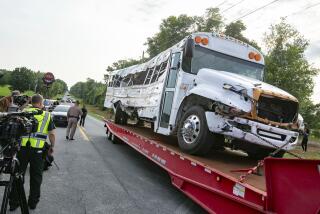Iowan to Lead Nation’s No. 1 Farmers Group : Favors Boosting Exports, Cutting Price Supports
- Share via
ATLANTA — An Iowa grain grower who thinks the future of American agriculture lies in expanding exports and lowering price supports won the presidency Thursday of the nation’s largest farm organization--the politically potent American Farm Bureau Federation.
Dean R. Kleckner, who grows corn and soybeans and raises hogs on 550 acres near Rudd, Iowa, edged wheat farmer Harry S. Bell of Ward, S.C., by a mere four votes of 280 cast here by the federation’s House of Delegates.
Bell, like many South Carolina farmers, favors a stronger governmental role in agriculture--particularly in setting production limits--than does Kleckner. But, as soon as the dust settled, Bell joined with the delegates in making Kleckner’s election unanimous.
The Iowan replaces Robert B. Delano of Warsaw, Va., who headed the farm bureau since Californian Allan Grant stepped down in 1980. Delano reportedly is in the running to succeed John R. Block as secretary of agriculture and has been invited to meet with President Reagan today.
Several Openings
If so, Delano’s visit will follow by one day that of Californian Richard Lyng, who formerly held the Department of Agriculture’s No. 2 job and served as director of the California Department of Food and Agriculture under then-Gov. Reagan.
Kleckner confirmed to reporters that Sen. Robert Dole (R-Kan.), who spoke to the federation on Tuesday, had sounded him out as a possible contender for the No. 2 job if Deputy Secretary John R. Norton III steps down, as is widely expected.
“I wasn’t interested (in the job) then, and I’m surely not now,” Kleckner said.
Kleckner said he considers the presidency of the American Farm Bureau Federation as second in influence only to the secretary of agriculture. “I’m not interested in any job in government,” he said.
It took an unprecedented six ballots for the 280 delegates representing nearly 3.4 million federation members to sort out Kleckner from among seven nominees.
Support From South
Henry J. Voss, who heads the California federation, was eliminated in the third round. Voss was later nominated with Bell and Jim Lockett of Oklahoma for the vice presidency, which Bell won handily.
Kleckner attributed his electoral success to support from the South, which controls more than 49% of the total federation votes. (The Midwest has about a third and the West less than 10% of the total.)
Since a Texan nominated Bell for vice president, some delegates assumed that Texas may have gone strongly for Kleckner for president, as did the West and the even less vote-rich Northeast.
After the voting, Voss praised Kleckner as possessing “what I believe to be the necessary requirements and qualifications for the job.”
These boil down to an ability to speak out strongly as a “voice of reason” on farm issues.
Farm bureau policy on a wide range of agricultural, environmental and social issues is set first among county bureaus, then at annual state meetings--such as the one held by California’s federation last month in San Diego--before being decided on at the national meeting each January.
The president is governed by those policies, Kleckner said, but the delegates know that these positions are subject to various interpretations, depending on their leader’s convictions.
“I intend to be an active and dynamic president,” Kleckner said at a post-election press conference.
He said he will follow through on a suggestion voiced by his predecessor in Delano’s opening address Monday--namely, to convene a meeting of farm leaders and private lenders in March to find ways to reschedule farm debt to help growers work their way out of a financial crisis that eliminated more than 400,000 producers last year and threatens to eliminate even more in 1986.
But, he warned, there is little that the organization can do in the short term to help farmers weather the present crisis. “It’s between them and their lenders,” he said, adding that he believes that creditors “will practice forbearance.”
Kleckner stressed, however, that the farm bureau must take a longer view of agriculture’s needs, including a reduction in government price supports and involvement in agriculture generally, as well as a far more aggressive export policy than has been practiced in the past.
Kleckner said it is “simply not true” that U.S. agriculture cannot successfully compete in world markets and should be sheltered from lower-priced imports.
“If we write off exports by foolish laws--stupid (protectionist) laws--it will sound the death knell of agriculture,” he predicted. (A number of protectionist trade measures are pending in Congress.)
“Sell, sell, sell--that’s got to be our motto from now on,” he said.
The farm bureau reaffirmed its support for a “market-oriented” national farm policy, meaning that “supply and demand, rather than government action, should ultimately determine production and price.
“Future farm program legislation should be designed to rely less on government and more on the market,” the group’s policy states, almost in Kleckner’s same words.
More to Read
Get the L.A. Times Politics newsletter
Deeply reported insights into legislation, politics and policy from Sacramento, Washington and beyond. In your inbox twice per week.
You may occasionally receive promotional content from the Los Angeles Times.










